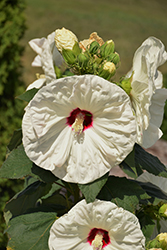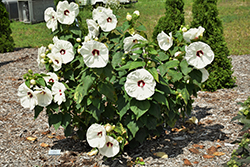It's all about ...
plants

Old Yella Hibiscus
Hibiscus moscheutos 'Old Yella'
Height: 4 feet
Spacing: 30 inches
Sunlight:
![]()
![]()
Hardiness Zone: 4a
Other Names: Rose Mallow, Hardy Hibiscus
Group/Class: Fleming Dwarf Hibiscus
Description:
This bold garden perennial features very showy, dinner-plate size, ruffled pale yellow flowers with crimson red eyes and attractive, dark green leaves; a sturdy and vigorous grower with compact shape; do not allow to dry to wilting point
Ornamental Features
Old Yella Hibiscus features bold buttery yellow round flowers with white overtones and crimson eyes at the ends of the stems from mid summer to early fall. Its large oval leaves remain dark green in colour throughout the season.
Landscape Attributes
Old Yella Hibiscus is an herbaceous perennial with an upright spreading habit of growth. Its medium texture blends into the garden, but can always be balanced by a couple of finer or coarser plants for an effective composition.
This plant will require occasional maintenance and upkeep, and should be cut back in late fall in preparation for winter. It is a good choice for attracting butterflies and hummingbirds to your yard. Gardeners should be aware of the following characteristic(s) that may warrant special consideration;
- Insects
- Self-Seeding
Old Yella Hibiscus is recommended for the following landscape applications;
- Accent
- Mass Planting
- General Garden Use
- Naturalizing And Woodland Gardens
- Container Planting
Planting & Growing
Old Yella Hibiscus will grow to be about 4 feet tall at maturity, with a spread of 3 feet. When grown in masses or used as a bedding plant, individual plants should be spaced approximately 30 inches apart. It grows at a fast rate, and under ideal conditions can be expected to live for approximately 5 years. As an herbaceous perennial, this plant will usually die back to the crown each winter, and will regrow from the base each spring. Be careful not to disturb the crown in late winter when it may not be readily seen!
This plant does best in full sun to partial shade. It requires an evenly moist well-drained soil for optimal growth, but will die in standing water. It is not particular as to soil type or pH. It is highly tolerant of urban pollution and will even thrive in inner city environments. Consider applying a thick mulch around the root zone in winter to protect it in exposed locations or colder microclimates. This is a selected variety of a species not originally from North America. It can be propagated by cuttings; however, as a cultivated variety, be aware that it may be subject to certain restrictions or prohibitions on propagation.
Old Yella Hibiscus is a fine choice for the garden, but it is also a good selection for planting in outdoor pots and containers. With its upright habit of growth, it is best suited for use as a 'thriller' in the 'spiller-thriller-filler' container combination; plant it near the center of the pot, surrounded by smaller plants and those that spill over the edges. It is even sizeable enough that it can be grown alone in a suitable container. Note that when growing plants in outdoor containers and baskets, they may require more frequent waterings than they would in the yard or garden. Be aware that in our climate, most plants cannot be expected to survive the winter if left in containers outdoors, and this plant is no exception. Contact our experts for more information on how to protect it over the winter months.
This plant is not reliably hardy in our region, and certain restrictions may apply; contact the store for more information.

